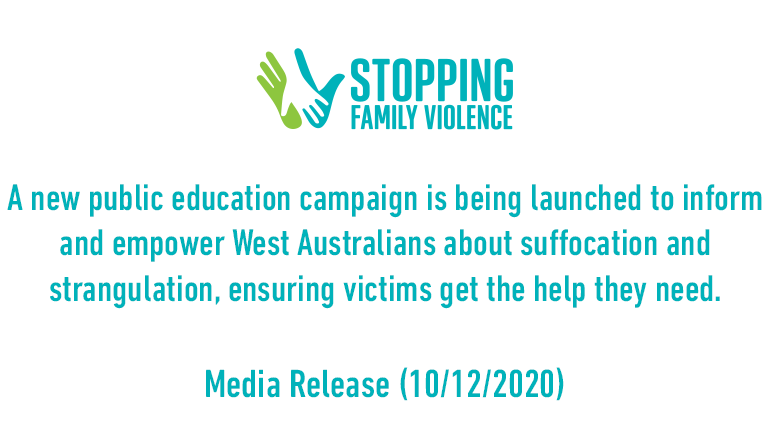STOPPING FAMILY VIOLENCE
CENTRE FOR WOMEN’S SAFETY & WELLBEING
Strangulation may result in a range of serious injuries that can cause death or permanent disability.
Australian statistics show that in 2017 to 2018, strangulation/suffocation was the cause of death in 6 per cent of all homicides and 9 per cent of domestic homicides.
The physical and psychological effects of non-fatal strangulation may not be immediately apparent, sometimes taking days to weeks to be evident.
In the context of intimate partner violence, non-fatal strangulation occurs as part of an ongoing pattern of coercive, controlling behaviour.
Ms Kedy Kristal, Acting CEO of the Centre for Women’s Safety and Wellbeing, describes non-fatal strangulation as “an exceptionally effective way to gain and maintain control as perpetrators literally hold victims’ lives in their hands.”
US studies have shown non-fatal strangulation by an intimate partner to be a predictive risk factor for future severe violence and homicide.
In Australia, death reviews have identified that domestic violence homicides are often preceded by an incident of non-fatal strangulation.
Coroner’s findings in Australian domestic violence homicide cases have highlighted the need to recognise non-fatal strangulation as a red flag for further severe violence and homicide.
Qualitative Western Australian data on non-fatal strangulation across approximately 20 metropolitan and rural refuges in 2018 (collected over a 6 month period) showed that 524 women and six children reported having experienced non-fatal strangulation at some time in their life.
Eleven of the women were pregnant at the time. The youngest child strangled was an eight-month-old infant.
The key aims of a specific non-fatal strangulation offence are to increase victim safety, prevent domestic homicide and more effectively hold perpetrators to account for serious offending.
Additionally, identification of a non-fatal strangulation offence on the criminal record of an individual may assist and inform safety risk assessments in any future protection, bail or parole orders.
On 27 November 2019, a discrete non-fatal strangulation offence was introduced in the Legislative Assembly as part of the Family Violence Legislation Reform Bill 2019.
On 26th of June 2020, it was passed through the Legislative Council.
The new non-fatal strangulation offence came into effect on 1st of October 2020 and carries a maximum penalty of seven years imprisonment.
WA Police have charged 77 people with the new offence between 1st October and 22 November 2020.
Damian Green, CEO of Stopping Family Violence, states that “The journey leading to the new non-fatal strangulation legislation was long and hard fought, and owes a lot to the leadership and knowledge of organisations such as the Sexual Assault Resource Centre and the Centre for Women’s Safety and Wellbeing.”
The Centre for Women’s Safety and Wellbeing and Stopping Family Violence congratulate the WA Labor Government for its commitment to introducing specific non-fatal strangulation legislation into Western Australia.
A new public education campaign is being launched to inform and empower West Australians about suffocation and strangulation, ensuring victims can get the help they need.
A video with a step-by-step guide to reporting the offence and getting assistance and support can be found here.
